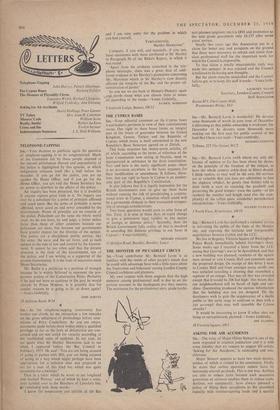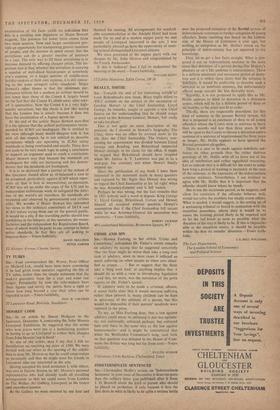ASKING FOR AIR ACCIDENTS SIR,—The voice of Major Oliver Stewart
is one of the most respected in aviation journalism and it is with some timidity that we venture to suggest hit article, 'Asking for Air Accidents,' is misleading and mis- chievous.
Major Stewart appears to have two main themes, neither of which is related to his conclusion. Firstly he states that airline operators reduce fares by increasing aircraft payloads. This is not true. Airlines are able to reduce fares because each successive generation of airliners enables them to reduce costs. Airlines, not unnaturally, have always pursued a policy of filling their aeroplanes to the permitted capacity with revenue-earning loads and a careful examination of the facts yields no indication that this is a startling new departure as Major Stewart suggests. The pressure for lower fares comes from two main sources. New and larger aeroplanes pro- vide an opportunity for transporting greater numbers of people, and the increase in speed means that the aeroplanes can do a greater number of journeys in a year. The only way to fill these aeroplanes is to increase demand by offering cheaper prices. The im- portant fact is that, whether the aeroplane is carrying a number of well-dined businessmen at somebody else's expense, or a larger number of middle-class holiday-makers at their own expense, it is still operat- ing to the same stringent safety -standards. Major Stewart's other theme is that the minimum per- formance criteria for a modern jet airliner should be not lower than those of the Comet 4, largely based on the fact that the Comet 4's climb-away after take- off is spectacular. Now the Comet 4 is a very high- quality aeroplane, but this thesis is just like saying that the London bus is unsafe because it does not have the acceleration of a Jaguar sports car.
At the end of the article Major Stewart says that it is his opinion that the airfield performances recom- mended by ICAO are inadequate. He is entitled to his view although many would disagree with it. but with all due respect, he is not entitled to describe aeroplanes which are operating to ICAO safety standards as being overloaded and unsafe. There does not seem to be very much logic in using a conclusion to support an argument used to reach a conclusion. Major Stewart says that because the standards arc inadequate the risks arc increasing and this demon- strates that the standards are inadequate.
It is to be deplored that a journel of the stature of the Spectator should allow so ill-balanced a case to be presented, particularly against ICAO which repre- sents all that is best in international co-operation. ICAO was set up under the aegis of the UN and its independent technicians work to safeguard the inter- csts of the world's air travellers. Its standards are respected and observed by governments and airlines alike. We wonder if Major Stewart has submitted his views to the technical committees of IATA and ICAO before trying them out on the general public. It would be a pity if the travelling public should lose confidence in the integrity of the operators, the manu- facturers and the independent Air Registration Board, none of whom would be party to any attempt to lower safety standards. In fact they are all seeking to improve them.—Yours faithfully,
DAVID HOLLINGS PETER GARNER
12 A bin ger A venue, Cheam. Surrey



























 Previous page
Previous page